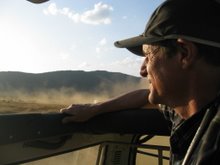
Mid- February, 2007
Kota Kinabalu is an enchanted mountain on the island of Indoneasia, the largest as it were, between the Himlayas and Australia, nearly hitting 14000 feet! It was a great pleasure and honor to climb the mountain and to venture through the Borneo rainforests of Tawan Kinabalu with the trabal people of the region. The people are progressive and aware of the the ecological significance of this park, both for the world's bio-diversity, and for the sustainability of their ability to live traditionally in the future with the support of the tourist industry. Kinabalu is the center of the Malaysian identity in the east, and the source of 8 major watersheds on the island.

The mountain is a definitive reference point from anywhere in Sarawak, and the source of their most important resources: drinking water, fishing, and irrigation for their farms. It is curious that Kinabalu's name is a mystery. David, the good caretaker of the Bed & Breakfast where I am satying, claims that "Aki Kinabalu" in the tribal language of Kandzuan, means "most revered place of the dead." But what is in a name? (even in a really cool name like "Kinabalu"). The place is incredible. Popularly thought to be a volcano, the mountain is actually spit in half to comprise 12 separate peaks, and is the world's youngest "pluton." A range bearing east-west 35 million years ago was beneath this single range and a pluton developed (only 1 million years ago) creating the spectacular 4101 meter mountain that more than doubles the size of every other mountain on the Indoneasian island. Glaciers only 35,000 years ago were responsible for shaping this granite-peaked mountain (joined by the forces of wind and rain and weathering). The birds and reptiles are truly incredible. It is a curious mystery why all the mammals are gone except the human.

And on this climb there was no shortage of humans. The only parallel experience I can draw from is Mt. Everst and the Khumbu Valley. The flora and fauna, since 3000 years ago and Kinabalu's last ice age, has presented a unique climate for speciation (furthermore because its on an island on the equator!). Islands in particular have a narrowing effect that advances evolution and speciation who face stronger forces to adapt. Darwin's finches, for example. There are 30 Million Choleoptera species (beetles) here!

The hike from the base of the mountain has presented this diversity and landscape in full. First the Liwagu river and then the rainforest approaching our mountain hut Laban-Rata. I enjoyed this stretch the most because of the rise in altitude. They have a Climbathon on this mountain in August that I am considering - its much more difficult than the Pikes Peak Ascent, however. I saw a few of the Nepenthes species (Pitcher Plants in the family Orchidae, which means "testicle" in latin because of the shape of the flowers). Nothing about this place reminds me of anything I have found at home or in other ecosystems.

Say your prayers for the poor Urangutaan. Sadly his numbers have been on the decline for decades. With the escalation of the deforestation and industrial efforts on the island things are not looking good. Something needs to be done. I had the pleasure of meeting a few in the wild and the chance to learn some of their ecology at a restoration center. Truly magnificent place, this Borneo. I hope that everyone knows its value and comes to love it. Maybe if we can come to love the world we will force ourselves to find means of protecting it... which I don't believe is at odds with the economic sustainability we all require. We are trying to find this balance and connection to the earth again. I feel this more and more out here. And yes, it is the dawn of a new day from the peak of Kinabalu and everywhere in the world. We have a new opportunity today to achieve our purpose here, both on and for the earth. "Did you get from this life what you wanted even so? I did. And what did you want? (what does eveyone want?) To call myself beloved. To feel myself beloved on the earth."




